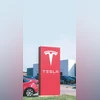Non-disclosure of key details, including price and investment outlook, has emerged as the key sticking point in the negotiation over the entry of Elon Musk’s Tesla in India.
The Texas-headquartered electric vehicle (EV) manufacturer has not disclosed pricing details for the introduction of its cars in the Indian market. Besides, there are also concerns regarding the calculation method of investment and the absence of a clear timeline for its entry, senior government officials told Business Standard.
“Tesla has been reluctant to share crucial details about its plans, specifically the targeted price point for launching its vehicles. Furthermore, the company is not providing a timeline for commencing the construction of its plant and initiating local manufacturing,” a senior official with knowledge of the matter said.
The government is cautious about Tesla’s plans due to pricing. The current cheapest Tesla model is priced at $48,590 (Rs40 lakh). During Tesla Battery Day in 2020, Musk had announced plans to produce a $25,000 (Rs20 lakh) electric car to offer more affordable models. The Indian government is concerned that if Tesla doesn’t confirm the price point before finalising the deal, it might take advantage of the Indian market by introducing more affordable models after the deal is completed.
“This high price point won’t give enough volumes to Tesla to justify building a plant in India. It is highly likely that Tesla will test the Indian market by introducing more affordable models. If, even after that, the company doesn’t find the market appealing, it might depart after leveraging years of duty cuts,” the official said.
Though Tesla is not divulging details of its plans regarding pricing and production timelines, it has agreed to provide a bank guarantee for the proposed investment, albeit with certain conditions. “They have agreed to provide a bank guarantee but have demanded to include their charging infrastructure and dealership network in the investment calculation,” the official said.
Presently, India only recognises the investment made in constructing plants and machinery as eligible investment.
The delay also stems from a directive issued by the Prime Minister’s Office (PMO) to the Ministry of Commerce and Industry, the nodal ministry leading negotiations with Tesla, instructing it to analyse the average car prices in India in comparison to other global markets. It has also asked the ministry to assess whether substantial duty cuts could potentially impact India’s ‘Make in India’ initiative.
“The PMO raised concerns about the challenges that could arise from a duty cut,” another person aware of the development said, requesting anonymity. “There hasn’t been any progress towards reaching a deal since the meeting with the PMO, which took place a month ago,” the person added.
Another contentious issue is the EV giant’s request to permit the import of its completely built-up (CBU) units at the duty rates applicable to completely knocked down (CKD) units. Presently, fully assembled CBUs exceeding $40,000 incur a 100 per cent tax, while those below $40,000 face a 70 per cent charge. In contrast, CKD units, involving reassembly in the destination country, are subjected to a 15 per cent import duty.
If Tesla receives the CKD duty rate and decides to launch its proposed $25,000 (Rs20 lakh) car in India, it would not only enter the luxury car market but also compete within India’s mid-range and premium car segments. Although the MG Comet stands as the most affordable electric car offered by a prominent automotive player in India at Rs7.98 lakh, the average price of EV cars in India typically ranges between Rs12 lakh and Rs15 lakh.
Tata Motors, the leader in India’s EV market, sells its highest-selling Nexon EV priced between Rs14.74 lakh and Rs19.94 lakh. Tata reached a milestone in June by selling 50,000 units of the Nexon since its launch in January 2020. From the launch of the Nexon until it achieved the 50,000 sales mark, a total of 86,000 electric cars were sold in India. Nexon contributed 60 units to this number, according to an analysis of the Ministry of Road Transport and Highways’ Vahan Dashboard data.
The EV market share in the country’s car segment is approximately 2 per cent of the roughly 3.5 million cars sold in CY23.
ROAD BLOCKS
>Tesla not divulging details of its India plans regarding pricing and production timelines
>There are concerns regarding the calculation method of investment and local manufacturing
>Agrees to provide a bank guarantee but has demanded inclusion of its charging infrastructure and dealership network in the investment calculation
Unlock 30+ premium stories daily hand-picked by our editors, across devices on browser and app.
Pick your 5 favourite companies, get a daily email with all news updates on them.
Full access to our intuitive epaper - clip, save, share articles from any device; newspaper archives from 2006.
Preferential invites to Business Standard events.
Curated newsletters on markets, personal finance, policy & politics, start-ups, technology, and more.
)